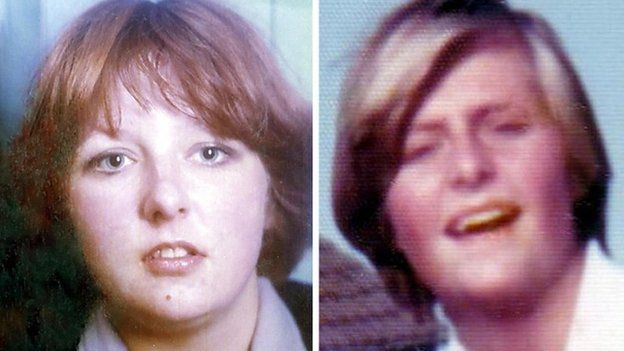World's End murders: 90-year-old witness at murder trial
- Published

A 90-year-old retired forensic pathologist has given evidence in the trial of a man accused of murdering two teenage girls 37 years ago.
Dr Robert Nagle was appearing as a witness in the trial of Angus Sinclair at the High Court in Livingston.
Mr Sinclair denies raping and murdering Helen Scott and Christine Eadie, who were last seen at the World's End pub in Edinburgh on 15 October 1977.
Dr Nagle said that someone had knelt on Ms Eadie and throttled her.
He told the court that he and a colleague carried out post-mortem examinations on both girls a few days after their bodies had been discovered.
Reports they compiled in both cases detailed the girls' injuries, internally and externally.
Pinpoint haemorrhaging
He said the injuries on the murdered 17-year-olds were consistent with someone who had been repeatedly punched and subjected to blunt force injuries.
In Ms Eadie's case, they included pinpoint haemorrhaging, abrasions, scratches, a "ligature track" around the neck, bruising to the mouth and pressure marks on the upper thighs, the court heard.
In most cases, the injuries would have been caused by an assailant, he told the court.
The pathologists' report, read to the court by Lord Advocate Frank Mulholland, who is prosecuting the case, concluded in Ms Eadie's case: "From our examination we are of the opinion that death was due to asphyxia due to strangulation with a ligature and by gagging of the mouth."
Mr Mulholland went on to ask the witness: "Are the injuries consistent with Christine Eadie being repeatedly punched, subjected to blunt force injury, someone kneeling on her with their hands around her neck, throttling her and placing a ligature around her neck, with a gag in her mouth and asphyxiating and strangling her?"
Dr Nagle agreed.
The court also heard details of Ms Scott's injuries, including scratches, a ligature mark and one injury consistent with a shoe "stomping on the left side of her head".
The report on her post-mortem examination, also read to the jury, concluded: "As a result of our examination, we are of the opinion that the death was due to asphyxia, consequent upon strangulation."
'Repeated punching'
Questioning the witness, Mr Mulholland asked: "She had injuries consistent with repeated punching, injuries consistent with stomping, an injury which could be consistent with kicking, is that correct?"
"Yes," replied Dr Nagle.
The prosecutor continued: "She also had injuries consistent with throttling, someone placing their hands around her neck, and also injuries consistent with the application of a ligature around her wrists during life and also around her neck during life?
"And as a result of asphyxia, throttling, strangling, has caused her death?"
Again, Dr Nagle agreed.
Later the court heard from forensic pathologist Professor Anthony Busuttil, 68, who prepared a report after studying post-mortem and toxicology analysis carried out by others on both girls.
He stressed that he was not directly involved in the post-mortem process.
He concluded it was "very likely" that the two murders were committed by the same person.
Factors such as the way the bodies were disposed of, the use of ligatures, the damage to the bodies, helped him reach that conclusion, he told the jury.
"It's likely that the two murders were perpetrated in a similar way, very likely by the same person or persons," he said.
Special defences
Mr Sinclair is alleged to have gagged the girls, bound their wrists and tied a ligature around their necks.
He denies inflicting blunt force injuries on Ms Eadie by repeatedly punching and kicking her on the body and biting her.
He also denies forcing Ms Scott to walk barefoot into a field, ripping the strap from her handbag, repeatedly punching and kicking her on the head and body and stamping on her head.
And he denies stealing clothing, footwear, jewellery and other personal effects from the teenagers in an attempt to pervert the course of justice.
Mr Sinclair has lodged three special defences, of incrimination, consent and alibi.
The trial continues.
- Published13 October 2014